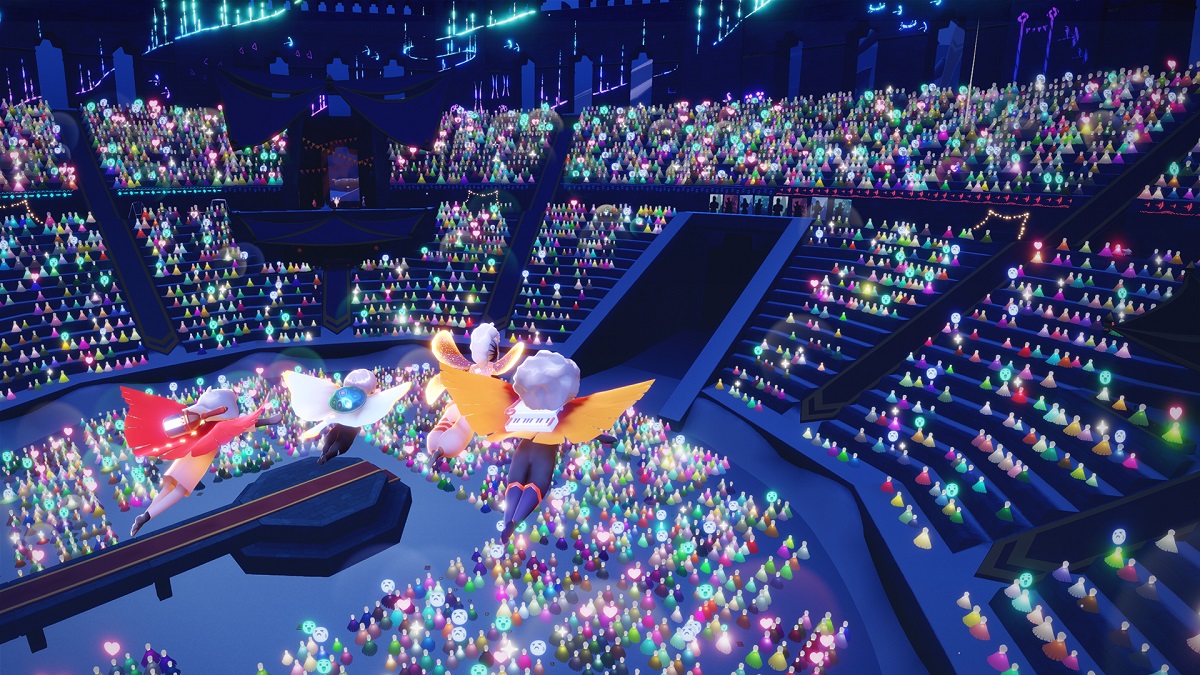
We’re thrilled to announce the return of GamesBeat Next, hosted in San Francisco this October, where we will explore the theme of “Playing the Edge.” Apply to speak here and learn more about sponsorship opportunities here. At the event, we will also announce 25 top game startups as the 2024 Game Changers. Apply or nominate today!
Thatgamecompany announced it had 10,061 people on screen at the same time in the same server for its latest in-game concert from superstar singer Aurora. And that enabled the company to officially win a Guinness World Record title of “Most users in a concert-themed virtual world.”
Additionally, the developers also won a world record title for “The most players emoting together at the same time in a video game.” Across all servers, more than 1.25 million participants joined in on the event.
Earlier this year, the company said it had more than 160 million people who downloaded Sky: Children of the Light, since the mobile game launched in 2019.
The title is an open world social indie adventure game, where players could have a cool experience in a beautiful world and share the emotional experience with friends. That enabled the company to raise $160 million in March 2022.
Event
VB Transform 2023 On-Demand
Did you miss a session from VB Transform 2023? Register to access the on-demand library for all of our featured sessions.
Back in December 2022, the company staged its first virtual concert inside the game with the musical artist Aurora. She sang a series of beautiful songs and the game took the players on a kind of spiritual animated journey. More than 1.6 million people watched that concert, which is replayed every day for a month.
Back then, each instance of the concert has 4,000 players in it, all moving individually with the crowd. That was far more people than online games can usually pack into a server space, and Chen said it took a lot of technical work to do. Now the number is above 10,000.
Sky is releasing on the PC later this year. Also, an animated series based on the world and lore of Sky: Children of the Light is coming in 2024, and the company debuted a new teaser. The series will tug at your heartstrings the same way the beloved online game does, featuring striking animation and music for fans to enjoy. I talked with Jenova Chen, CEO of Thatgamecompany, at Gamescom 2023.
Here’s an edited transcript of our meeting.

GamesBeat: What’s the latest for you? I think we talked last just after the concert.
Jenova Chen: What you see here is Sky on PC. What I tell people is, you have to experience it on PC because it can’t ever be captured. It’s 4K at 120fps. You can’t do that on YouTube. It’s HDR. You can’t have true HDR on YouTube. The time of day shifts. I can show the difference.
GamesBeat: Did you do it in Unreal?
Chen: No, it’s our own proprietary engine. It has these feelings that you’d never experience in a normal game. Let me take you to the concert venue. We worked on the PC version for a year. We really pushed it. On a big screen we have to look at every single pixel to make sure it looks nice. So what’s the largest online game you’ve ever played? The most players in a game?
GamesBeat: I saw the Otherside demo from Improbable. They’ve said they can get 20,000 in a space.
Chen: Are they all on the same screen, the same server?
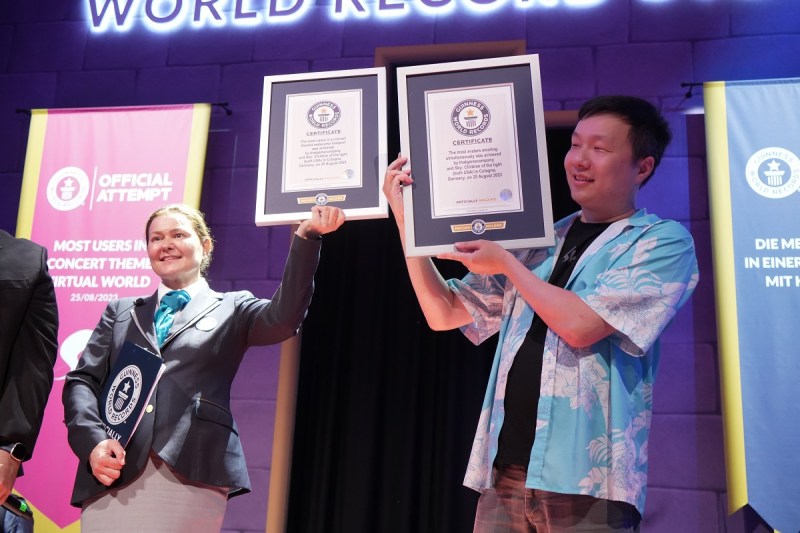
GamesBeat: The same screen, yeah. It looks a bit like this. It’s only demos, though. They’ve done two demos now.
Chen: If you’re talking about that, I’m sure it’s 7,000. I’ve done the research. We just need to beat them with 7,000. Largest ever online crowds. One thing I wanted to show you, some of the things we’re doing–the key is we really wanted to show the reactions of the players. In the live show we already did that, but this time we’re allowing them to do it in organized groups. They can share. You can see groups of people chatting. This is recorded from last night. We had a group of people playing soccer, 5,000 versus 5,000. This is the tug of war that just finished. There’s a parade they can join that runs through the whole stadium. We’ve added quite a lot. We have some server issues, but it’s not affecting the players. You can see the tug of war. The losing side will be pushed out.
GamesBeat: How do you do some of this without having to create a brand new game engine or taking over every server at Amazon?
Chen: We did work with Amazon. They’re part of the record as well, the largest online crowd gathered in the same place.
GamesBeat: But it’s not just raw computing power. It’s doing something more clever.
Chen: You can only send so much through a cable from the server to the player. It’s more about how you compress 10,000 people’s movements and send them smoothly without any loss. The way we do it is almost like a JPEG file. We compress nearby people to have more fidelity. If they’re farther, they have less fidelity. It’s really about compression numbers.
GamesBeat: A different level of compression throughout the whole field of view?
Chen: Yes. Under normal circumstances we can’t push this much data. We have to use compression. It’s not a server problem. You can see, on the server side, this is what’s going on there. Same stadium. You can see the platforms, the PlayStation, Switch, Android, and iOS all playing together. People are from different countries. A lot of Asian countries here. Almost no European countries. The U.S. and Asia. That’s why we’re here at Gamescom, to promote that.
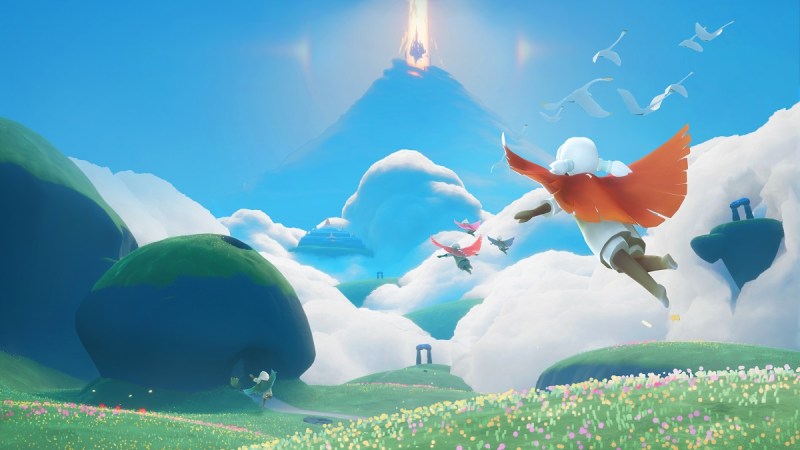
On the other hand, we’ve been working on an animated series, which we hope can also bring a new audience to the world of Sky. We’ll release a teaser of the animated series. We were just making small videos for that. I have a high standard of quality, though. I just keep pushing the team, and now it’s almost like a Pixar movie quality. It tells the story of two children, and the drama about the two of them trying to help people. One of them seeks power to change the world, but in the process he’s corrupted and destroyed. The other one tries to save the world by convincing the former world to give up its power. The boy becomes a king.
GamesBeat: It’s wordless?
Chen: Right. Very rarely will you find a film or animated series that does that. But there will be narration, because people do need some context.
GamesBeat: How much of the series will you make?
Chen: It’s 10 episodes, around two and a half hours all together. We started working on it two years ago. We’ve changed the script a couple times already. I’m the director. It’s always happened for a good reason. It becomes pretty dark in the latter half of the series.
I think I showed you this video before. This is the China flash mob. When they did this, they asked us, “Hey, can you allow us to talk to the stadium people?” With Sky, you can’t just publicly chat with 10,000 people. At their request, we started to give them more capabilities. In the game the players can leave augmented messages. I’ll show you that. Here are the memory tracks. Players can upload user-generated content.
GamesBeat: You have user-generated content. Do you have AI as well?
Chen: We’re kind of working toward the reverse of AI. We want real human-generated connections. We show real people talking. Here at home, there will be messages left here. They wanted to create content for each other. We allow the players to work with each other, almost like a Seinfeld episode, and letting the entire server be able to see it. Not only asynchronous, but also synchronous. That’s our ultimate mission, where you can actually perform live as a band in front of the entire server. This is what our influencers and content creators want, so we wanted to enable them.
We can never make content as fast as the players want it. If we empower the players to create their own content, that’s great. We’re not here to create a level. I care about user-generated compassion rather than content. If they can create an immersive experience, whether it’s performance, whether it’s music, whether it’s even telling a joke, that’s what I think will be interesting. Also, the content is delivered in the world of Sky. It’s not like you just go to a window and see it. They’re in the world.
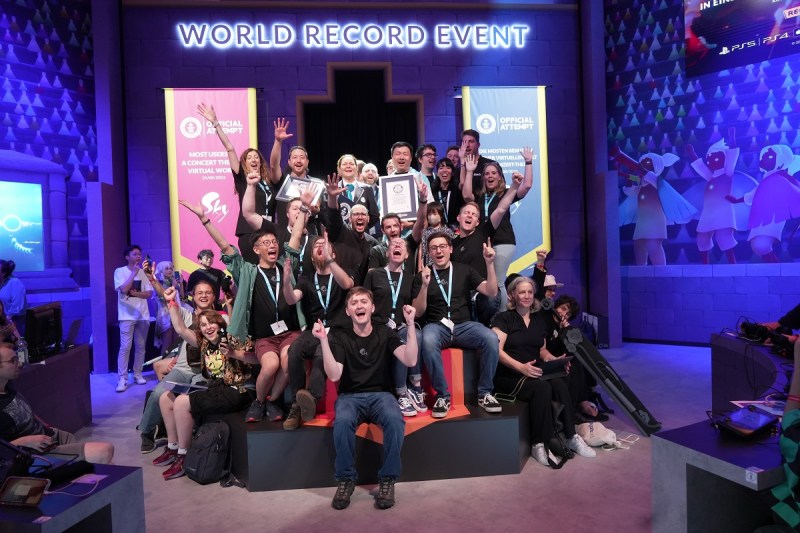
GamesBeat: How much content are some of the most active people creating?
Chen: Right now, as far as I know, there’s close to 900,000 user-generated content pieces in our database. I don’t know if that’s one day, or if it’s currently live. Not all of it is good. There are lots of newbies at work.
GamesBeat: That’s one of the common comments I hear about how AI can help this kind of thing. Users have good ideas, but they don’t yet have the skill to make things.
Chen: Sure. The challenge with AI is, a lot of companies are using AI to create fan art. If they’re not really fans, that’s a problem. I don’t think AI can capture the emotion we want. AI can draw characters, but it can’t capture the camaraderie between players.
We’re currently doing a Steam playtest. We’ve closed that for now. We’re only giving it to influencers and beta testers. It’ll open up later, and we’ll launch the PC build later this year.
GamesBeat: Is it a cross-play experience?
Chen: Yes. Everything is on one server. Everybody is cross-platform, cross-country. There’s only one world.
GamesBeat: Do you have an idea of how many people have played by now?
Chen: It’s 260 million now. Daily is about 7.5 million. Monthly is around 50 million.
GamesBeat: You’re about a quarter of the way to Roblox.
Chen: We’re pretty far from Roblox. Roblox is huge. Obviously, we only really have an audience in Asia and the U.S. A lot of the journalists here have said, “What is this game? I’ve never heard of it.” That’s why I’m glad we’re here. Hopefully we can capture some new audience.
GamesBeat: The whole game as a service thing, it must be less stress on the team. If you have so much user-generated content–
Chen: User-generated content has saved us for the last four years. Most of the content is social engagement. I’ve made friends. We can crack jokes about the existing content. We can talk about our own lives. That’s real content. It’s kept the players playing. But we want our players to be able to express their emotions and their personalities even more than just through text. That’s why we’re doing the instruments. All kinds of new notes. We want the players to not only be able to provide content through their lives. We want them to provide content in an asynchronous way. That’s the direction we’re following to keep the platform relevant.
GamesBeat: What’s the timeline on the animated series?
Chen: We’re releasing the teaser with IGN this week. Early next year, around March, that’s when we’ll release the pilot episode. But we haven’t announced anything exact yet. The full trailer you saw, we’ll launch it around the global PC launch in November. What do you think about–the Guinness record we have is the largest audience in a virtual concert in the metaverse. The metaverse at this point is associated with Facebook more than the general concept of virtual worlds, though. But because of the record we have to call it the metaverse, because that’s how we categorize things.
GamesBeat: I think a lot of people now are retreating from the word “metaverse,” because Meta kind of claimed it. They started making fun of what’s happened with Horizon. Things kind of went downhill, what with the losses associated there. The use of the word, last I checked, had dropped by half.
Chen: That’s why I wanted to call it a virtual world.
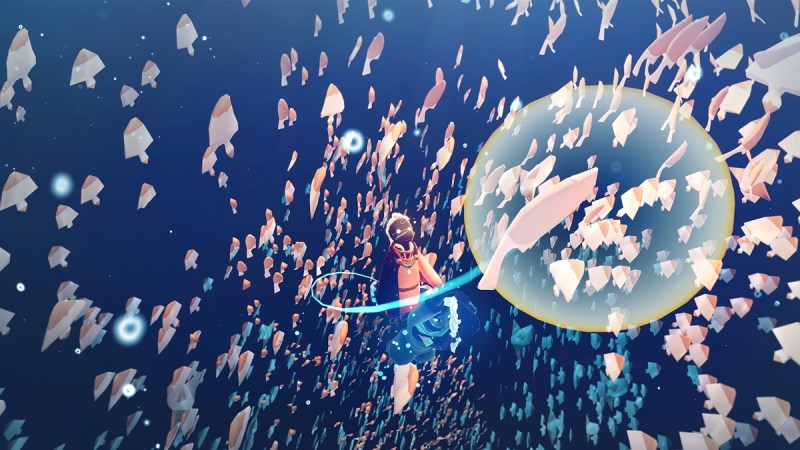
GamesBeat: I’ve always felt like the metaverse isn’t Second Life. It’s the Star Trek holodeck. I’m still hung up on that as the metaverse. I don’t think we’re anywhere near it. But I do think the whole structure of things–many companies, an open metaverse, transportable avatars, items you can take with you from one world to another, that’s naturally the metaverse. It’s not just one company building a walled garden. When you think about it that way, we’re nowhere near being in that metaverse.
Chen: There is still no alliance. We’re all in our little channels.
GamesBeat: There was a joke Tim Sweeney made. All of the 6-7 million of us that go into the metaverse every day are going to have a funeral for the metaverse because the metaverse is dead. I think the fad part of it is dead or dying. But the reality of it, everybody is still pushing. Maybe Yuga Labs–Improbable was suggesting to me that they got 20,000 people in one instance. Yuga I don’t think has said an official number. They did do more than the first one, which I think is 4,000.
Chen: We do 4,000, and this is live constantly. If you’re purely talking about capabilities based on our algorithm, we could do 40,000 on PC. But Android can’t render 40,000 entities.
GamesBeat: What I think is interesting is how you talk about cleverness over infrastructure. It feels like to do the metaverse how we want, we’re going to need a new internet. We’ll need supercomputing servers. That’s how we’ll get the ability to do so much.
Chen: We’ve done 10,000. The truth is that between 4,000 and 10,000, your perception can’t even tell. You can’t tell which one is which. We’ve already hit a perceptual limit. The challenge for the metaverse is, can you make 10,000 people feel emotionally collaborative? That’s what we hit with our concert. But I don’t think anyone else is trying to create emotion between people.
GamesBeat: How much more communicating can be done without all the risks of toxicity?
Chen: This year we’re really testing the limits. We keep pushing the possibilities. When we did the chat we were worried. What if people are just posting hacking bots and things like that? When we tested this, our engineers tried to keep it relatively brief, like two seconds per message. Even if someone says something offensive, it doesn’t stay around. You can sense the energy. If you limit the time, it doesn’t go toxic, the time people can say something. We’re pushing the edge of how we can allow people to communicate without getting toxic.
GamesBeat: There’s some hope that AI will be able to contain that kind of thing.
Chen: It helps, but I believe that AI is only going to be as good as–it can register things that look bad on the surface, but it can never outsmart people. Like, if I speak both Japanese and English, I can do a combination. Other people might understand it, but the AI might not. With our design–I think people are toxic not just because they’re jerks. People are toxic because two things are happening. First, they’re creative. They want to incite a response by creating something that stirs that response. Second, in the metaverse there are no social consequences.
With Sky we create social consequences to make people behave better. If you leave content and it’s anonymous, you can say any offensive thing you want. But in Sky, when you create content, your friends can tell that it’s your content. Your friends create a kind of social surveillance. You don’t want to say something really nasty and let your best friends know that you’re that kind of person. So, people don’t do it. Just like in real life. Everybody’s watching you. The social consequences stay with you.
I believe that in addition to AI, it’s really about how you create a social structure for the metaverse. If social consequences come with you, then it will be a lot better.
GamesBeat’s creed when covering the game industry is “where passion meets business.” What does this mean? We want to tell you how the news matters to you — not just as a decision-maker at a game studio, but also as a fan of games. Whether you read our articles, listen to our podcasts, or watch our videos, GamesBeat will help you learn about the industry and enjoy engaging with it. Discover our Briefings.






